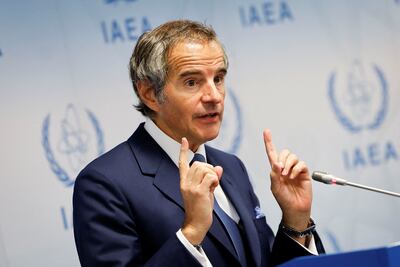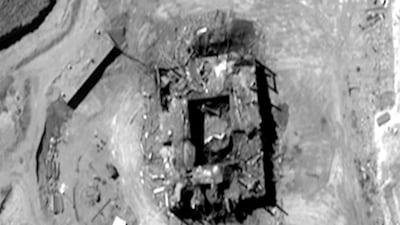Syria is poised to come in from the cold at the UN’s nuclear watchdog, with the agency’s boss travelling to Damascus this month.
Rafael Grossi revealed he was invited by Syria’s government in order to “re-establish a meaningful, constructive dialogue”.
His talks on “remaining issues from the past” are likely to address a suspected Syrian nuclear reactor that was destroyed in an air raid by Israel in 2007.
Syria denied it was a secret nuclear site and the matter has never been cleared up to the International Atomic Energy Agency’s satisfaction.
Mr Grossi, the IAEA director general, is similarly pressing Iran to explain the presence of uranium at two undeclared sites several years ago.
He will also visit Iraq this month, expecting a “confirmation of its unwavering commitment to non-proliferation”.
Speaking at an IAEA board meeting on Monday, he warned of a domino effect if arms control is not maintained in the Middle East.
The agency is “trying to uphold the non-proliferation norm to the best of our abilities” at a time of conflict in the region, he said.

The Syria issue has lain dormant during the country’s long civil war, with President Bashar Al Assad’s regime accused of stonewalling the IAEA.
The agency assessed in 2011 that the desert site at Deir Ezzor was probably a secret nuclear facility. Syria, which has no known civilian nuclear programme, denied this.
The US alleged that Syria, assisted by North Korea, was building a reactor far from any civilian grid that appeared suited to make plutonium.
The site was destroyed in a night-time air raid in 2007, with Israel’s military later confirming suspicions it was responsible.
No new information has come to light in recent years, with the US last year accusing Syria of hoping the IAEA would “lose interest”.
However, Syria's isolation has thawed and Mr Grossi told the board he was approached over the weekend by Syria’s Foreign Minister Faisal Mekdad with an invitation to Damascus.
The mission to Syria will take place on March 19, “immediately after” a visit to Baghdad, Mr Grossi said.
He welcomed Syria’s offer to “re-establish a meaningful, constructive dialogue and process to facilitate the clarification of remaining issues from the past”.
“I will start again my efforts in Syria, which is a very important case which has been continuing without a concrete outcome or a resolution for a long time,” he said.
“It’s been 13 years since the IAEA board of governors adopted a resolution regarding the situation there. We have been talking past each other.”
No progress on Iran
By contrast, Mr Grossi said he had no breakthrough to report on Iran, which has continued to increase its uranium stockpile.
Mr Grossi said he doubted whether Iran “remains committed” to resolving its dispute with the IAEA over mysterious uranium traces.
Iran has "not provided the agency with technically credible explanations" for the presence of uranium particles or revealed where the nuclear material is now, he said.
He said he was frustrated by Iran’s decision to withdraw credentials for experienced IAEA inspectors last year.
“We’ve been exchanging on this. It’s not like there hasn’t been a conversation on this. But I haven’t received any positive answer on it,” he said.
Despite these concerns, the IAEA's 35-member board is not expected to confront Iran with a fresh resolution at this week's meeting. Tehran denies pursuing a nuclear weapon.
Asked about the war in Gaza, Mr Grossi said he had condemned “loose talk” of Israel using atomic weapons in the enclave. Israel is widely assumed to have nuclear arms but has a policy of neither confirming nor denying this.


